Media | Articles
Review: 2022 Genesis G70 3.3T RWD Launch Edition
Even for those familiar with its brief history, the Genesis G70 is an oddity. It’s a compact, performance-oriented luxury four-door from a largely unknown brand lacking any motorsports heritage—a marque whose name, just five years ago, denoted a full-size Hyundai sedan. A full-fledged brand of its own since 2015, Genesis is owned by that same Korean auto giant and has in short order demonstrated its commitment to old-school luxury. Its most impressive offerings so far have been well-built, V-8-powered sedans with spacious, elegant interiors upholstered in wonderful leather.
No sooner did Genesis establish a theme than it began to riff on it. Its smallest four-door offering, the G70, first launched in the U.S. for the 2018 model year. It’s noticeably less posh than the full-size patriarch of the brand, the G90 (successor to the Hyundai Equus) as well as the swanky mid-sizer known as the G80 (successor to the Hyundai Genesis). Think of the G70 as a rival for low- to medium-wick versions of BMW’s vaunted 3 Series. Judging by age alone, the G70 is a fresh-faced toddler with an unknown name in a room of silver-haired blue-bloods. Its greatest strengths don’t lie in high tech or sheer performance. But if you’re wearied by the usual suspects, this stylish South Korean sedan will quickly win you over by its self-possessed attitude and reasonable price tag.

With the refreshed 2022 G70, Genesis’ now five-vehicle lineup (rounded out by the GV70 and GV80 SUVs) wears a consistent wardrobe, a design language dominated by a large, mesh shield grille and a parallel-line motif picked up in the headlights, taillights, and brake vents. Basking-shark face aside, the G70 cuts an unassuming figure that’s refreshing in its understated simplicity. The G70 goes subtle with chrome, even around that massive grille, whose careful execution proves that big doesn’t have to be clunky. As it tapers to a point in the lower fascia, the bodywork defining the edges of the mesh shield slims, lending delicacy to a very black-heavy front end. Especially from the front, the new 2022 sheetmetal conveys a far more confident personality than the outgoing model, one finally cohesive with the look of Genesis’ other models. The contrast between the matte paint and glossy wheels on the one-of-500 Launch Edition examples (shown here) is striking, though the edition-specific Verbier White finish does show every atom of dirt. (In your author’s opinion, looking that good is worth the pain of upkeep—debate at will in the comments.)
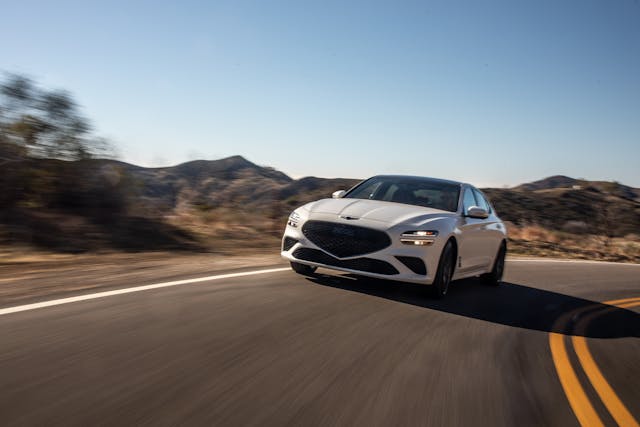
Underneath, the G70 shares its rear-drive platform with the Kia Stinger. The latter is the underdog performance sedan from Kia, the other South Korean brand busy shaking off the smell of the Enterprise lot by building genuinely desirable vehicles. This architecture is the handiwork of ex-BMW M engineering vice president Albert Biermann and accommodates both inline-four and V-6 powertrains, plus rear- and all-wheel drive. Our rear-drive tester boasted the top-tune V-6, a 3.3-liter, twin-turbocharged affair making 365 hp and and 376 lb-ft of torque. Compared to the Stinger, the G70’s wheelbase is 2.8 inches shorter to improve turn-in and yield more nimble performance. Drivers will praise the decision; rear-seat passengers over six-foot will not.
The cabin tells much the same story as the outside. The designers weren’t obsessed with being different for different’s sake, and thus were free to borrow the best of new and old luxury. The lines of the dash, steering wheel, and console are clean, horizontal, and minimalist, accented by rich colors and dramatic textures. In our tester’s case, those are headlined by wine-red Nappa leather (another Launch Edition exclusive) and engine-turned aluminum. The latter is artificial, but your author is a sucker for a little steampunk-flavored nostalgia. Those with longer memories will note that sometimes fancy upholstery promises a plushness it does not deliver: Hagerty’s Sajeev Mehta, fluent in all things swanky and retro malaise, declared that the rear seats in particular “are not quilted for your pleasure.”
Marketplace
Buy and sell classics with confidence
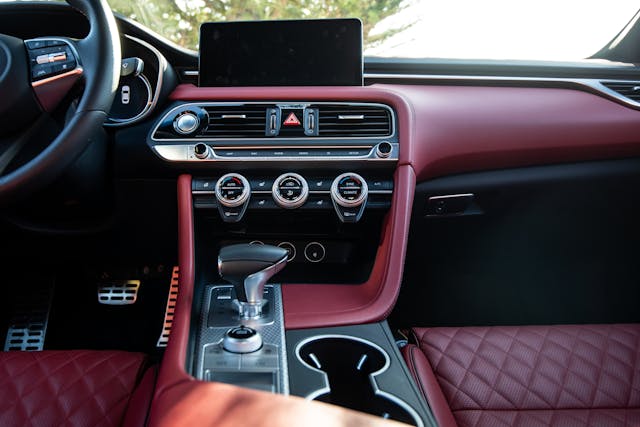
Glance at the Stinger’s interior, with its flat-bottom wheel and propeller-like climate control vents, and you’ll see how consciously more mature the luxurious G70’s design is, even if some knobs and screens are borrowed from within the Hyundai/Kia family. Genesis preference for simplicity shows in the absence of high-tech gimmickry: You won’t find fussy haptic-feedback touch sliders here. The flashiest element is safety-focused—a blinker-activated live feed of either blindspot relayed to the right-side “gauge” in the digital instrument cluster, courtesy of cameras on the bottom of the sideview mirrors. On Hyundai Group’s beefy three-row SUVs it’s a lifesaver; on this tidy four-door, it’s a conscientious convenience. One indulgence, however, that would elevate the visual impact of top-tier G70s like this one would be the “3D” digital gauge cluster from its SUV sibling, the GV70.
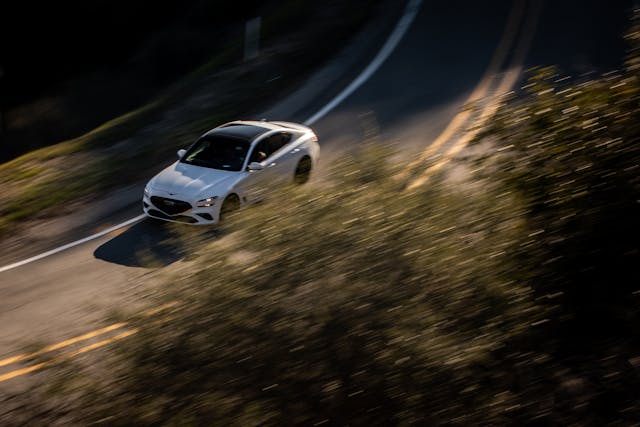
The G70 proved well-mannered and supremely comfortable through California gridlock, but once we switched to Sport mode and flung it into some of Malibu’s canyon roads, its rowdier side emerged. The eight-speed auto holds gears predictably and well, and torque lunges to attention at a flex of your big toe. Climbing out of the red-upholstered cabin, Associate Editor Kyle Smith curled fingers to meet his thumb. “These turbos have got to be, like, this big.” As soon as the power hits the seat of your pants, it’s relayed to your eardrums with a dramatic honk from the exhaust.
The quilted seat’s false advertising is a boon during spirited driving; the chairs are firm and supportive, and the adjustable side bolsters tuck in when you select Sport mode. Sport+ deactivates traction control, but yours truly decided to swallow her pride after glancing leftward into an actual ravine and leave it in Sport. Executive Editor Eric Weiner, perhaps because he dailies a Fiesta ST with exponentially more spunk than my ’80s Volvo, hustled the G70 a bit harder, noting that the sedan is “more willing to wiggle than a 3 Series,” and that it will predictably rotate mid-corner with a gentle lift of the throttle. Steering is accurate though not talkative. Even equipped with the limited-slip diff (we’ll break down specs below), and posting a respectable 3774-pound curb weight, this sedan feels more brute than princess, mainly due to the aggressive throttle mapping. The brakes accounted for our only complaint: After a few hard runs up and down a mountain road, the pads heated up and produced a spongy pedal.
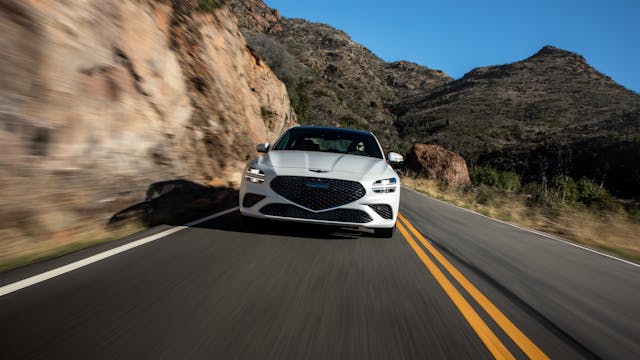
Performance nuts will be happy to know that the performance goodies on the limited-run Launch Edition cars are available throughout the rest of the V-6-powered G70 lineup. (“Launch Edition” translates to $2100 worth of matte paint and red leather.) Most G70 customers will have two add-on choices after powertrain: Sport Advanced and Sport Prestige. The former adds a sunroof, wireless charging, a 15-speaker stereo, and alloy pedals for $4300. The latter stacks on the limited-slip diff, the Brembos, a head-up display, and the snazzy blind-spot detection system for $8300. Option a 3.3-liter car with the LSD and good brakes, and you’re looking at $51,445 with destination. Surprisingly, the price of even such a highly-optioned G70 undercuts that of its chassis-mate, the Stinger GT2, which shares the same powertrain. If you’re cross-shopping the two, the difference lies in personality; the Stinger is more of a GT car compared to the agile G70, and a brief test drive will quickly indicate which one suits you more.

Look outside South Korea to the BMW M340i and the Audi S4, and the G70’s value proposition becomes more obvious. An M340i with zero options costs $55,520, though you do get 382 hp and a turbo straight-six rather than Genesis’ 365 and twin cylinder banks. A bare-naked Audi S4 falls close to the G70 in price with an out-the-door price of $52,945, but it has 16 fewer hp and you can’t get a rear-drive version.
Let’s cut to the chase: If you consider brand recognition to be non-negotiable in a fifty-plus-thousand-dollar performance sedan, the Genesis is laughably irrelevant. Many, no doubt, will fall in this camp. It’s not a status symbol if it requires explanation in the Starbucks parking lot. Others, however, will find the lack of skeletons in the G70’s closet to be the most attractive thing about it. The G70 may not win the 0-to-60-mph stat battle against the M340i, but this South Korean newcomer’s competent performance and understated glam is bound to win over those avant-garde customers who second-guess the supremacy of the all-time compact-sedan greats.
2022 Genesis G70 3.3T RWD Launch Edition
Price: $43,145 (base 3.3T RWD) / $53,545 (Launch Edition RWD)
Highs: Clean-slate reputation. Amazing paint. Punchy powertrain befitting of its upscale vibes.
Lows: Nobody knows what the heck you’re driving, and the BMW guys will roll their eyes when you to explain. Matte finish shows every atom of dirt. Seats are too firm to be plush.
Summary: An imperfect yet self-possessed newcomer in the compact luxury space. More than just the highly reasonable price tag makes it a compelling alternative to the machismo-laden German brands.


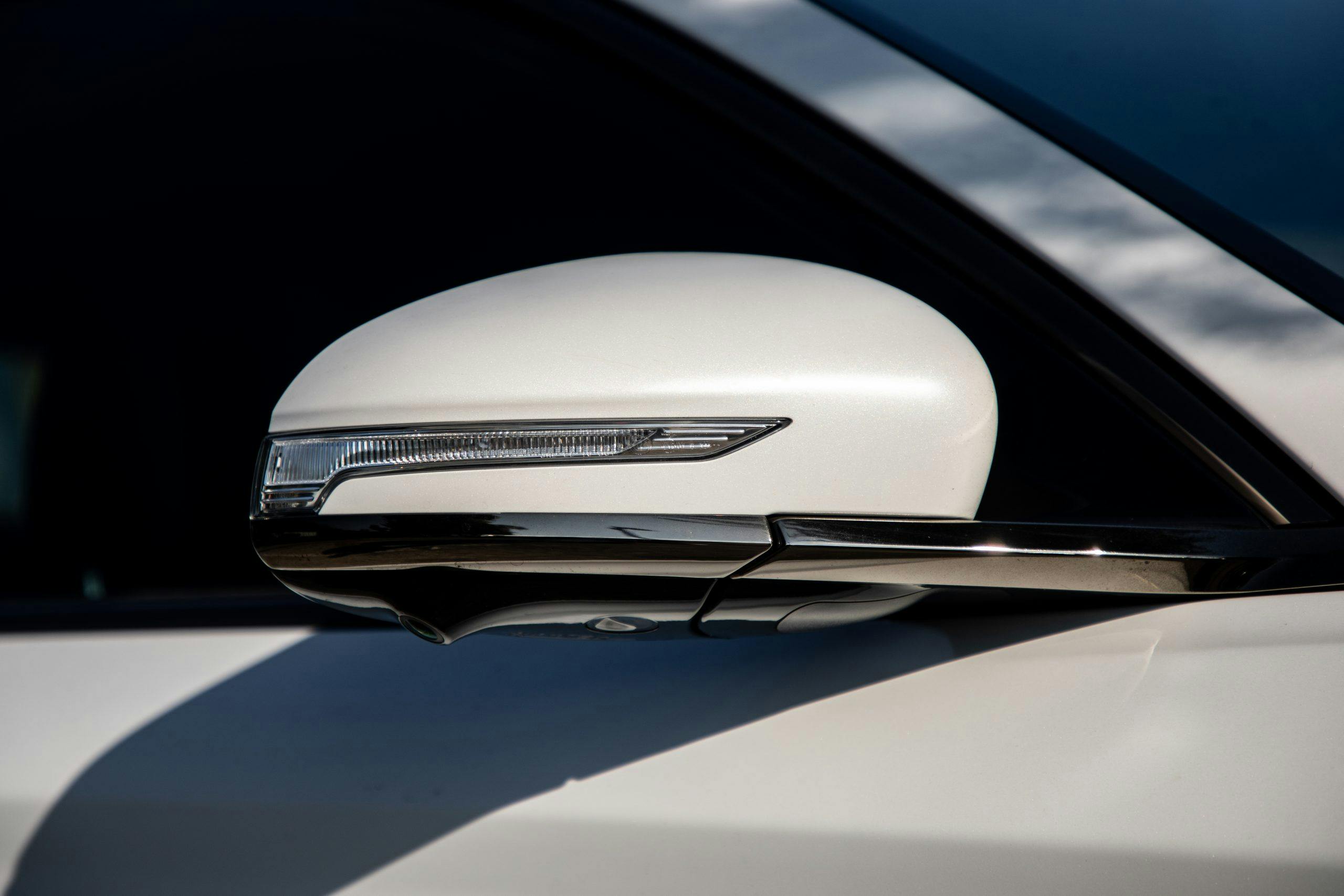
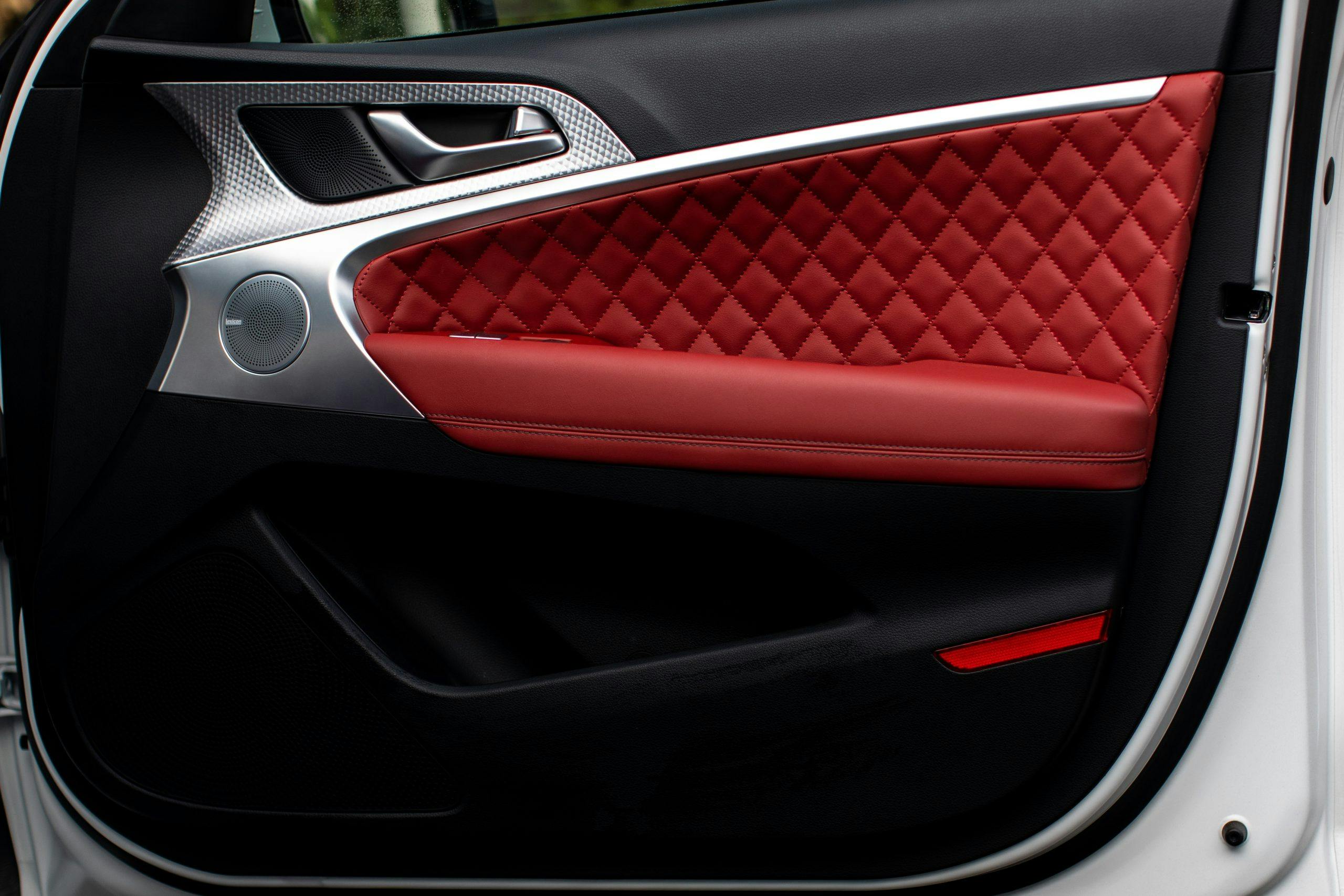
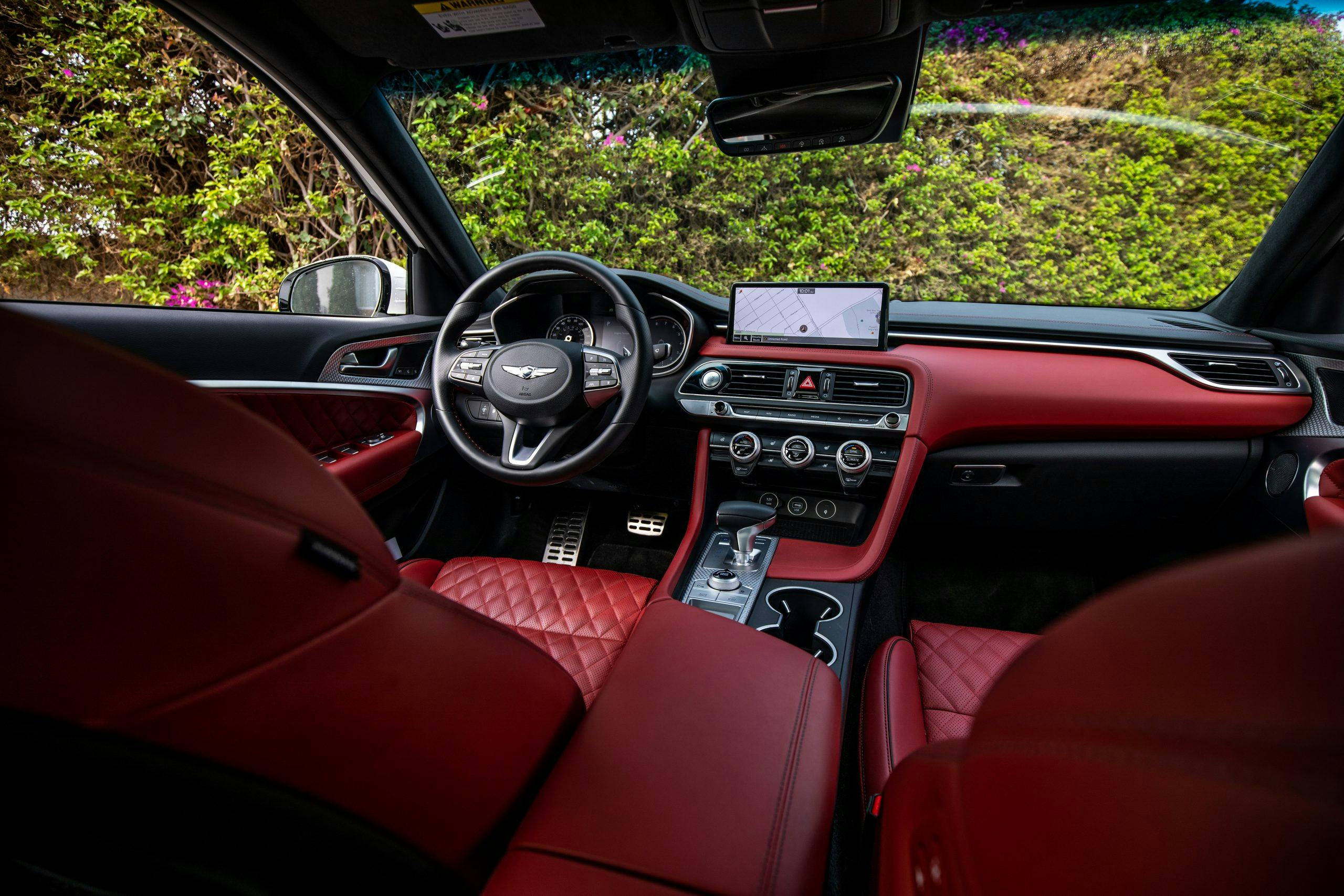

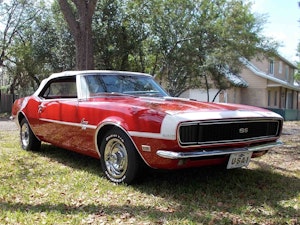







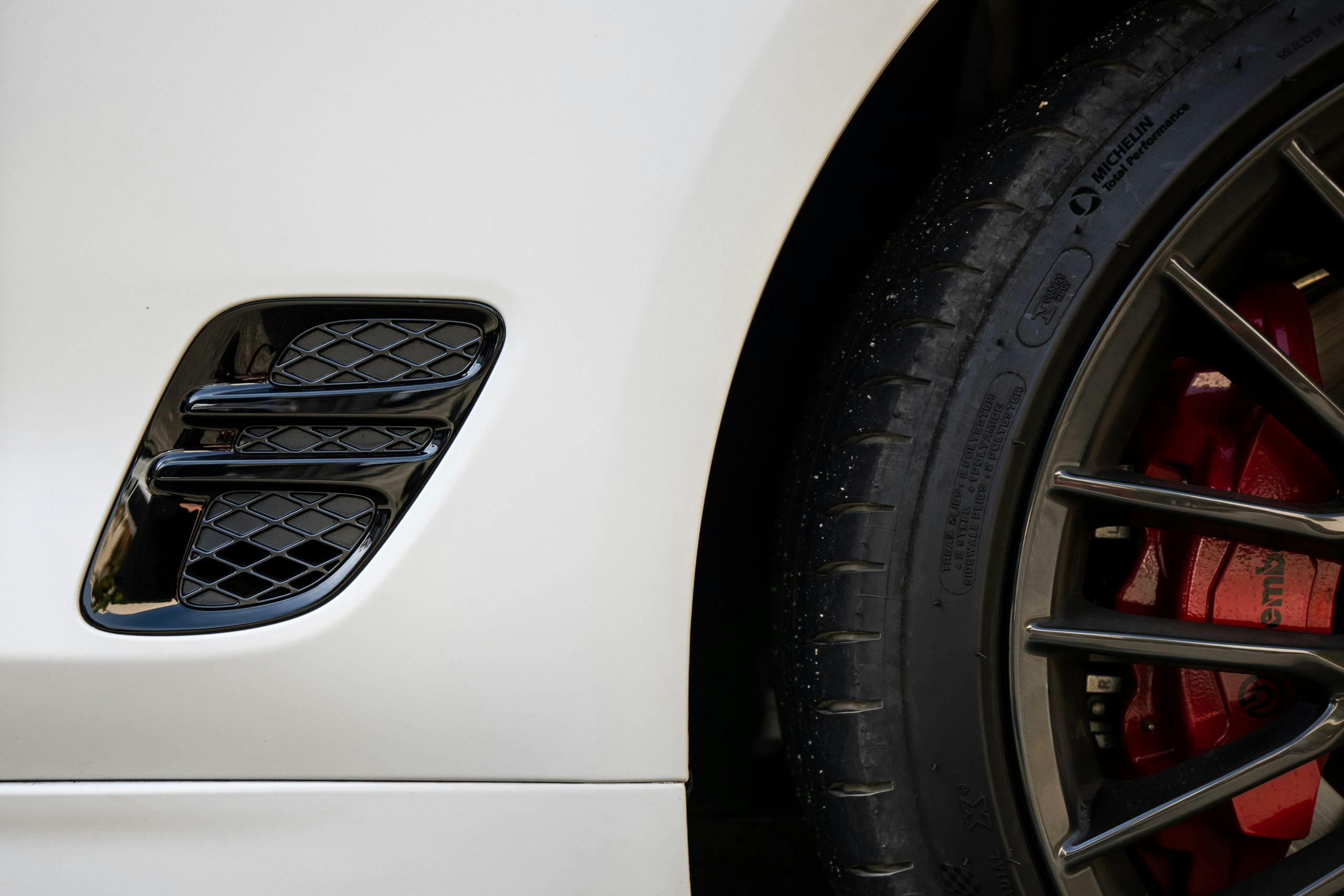
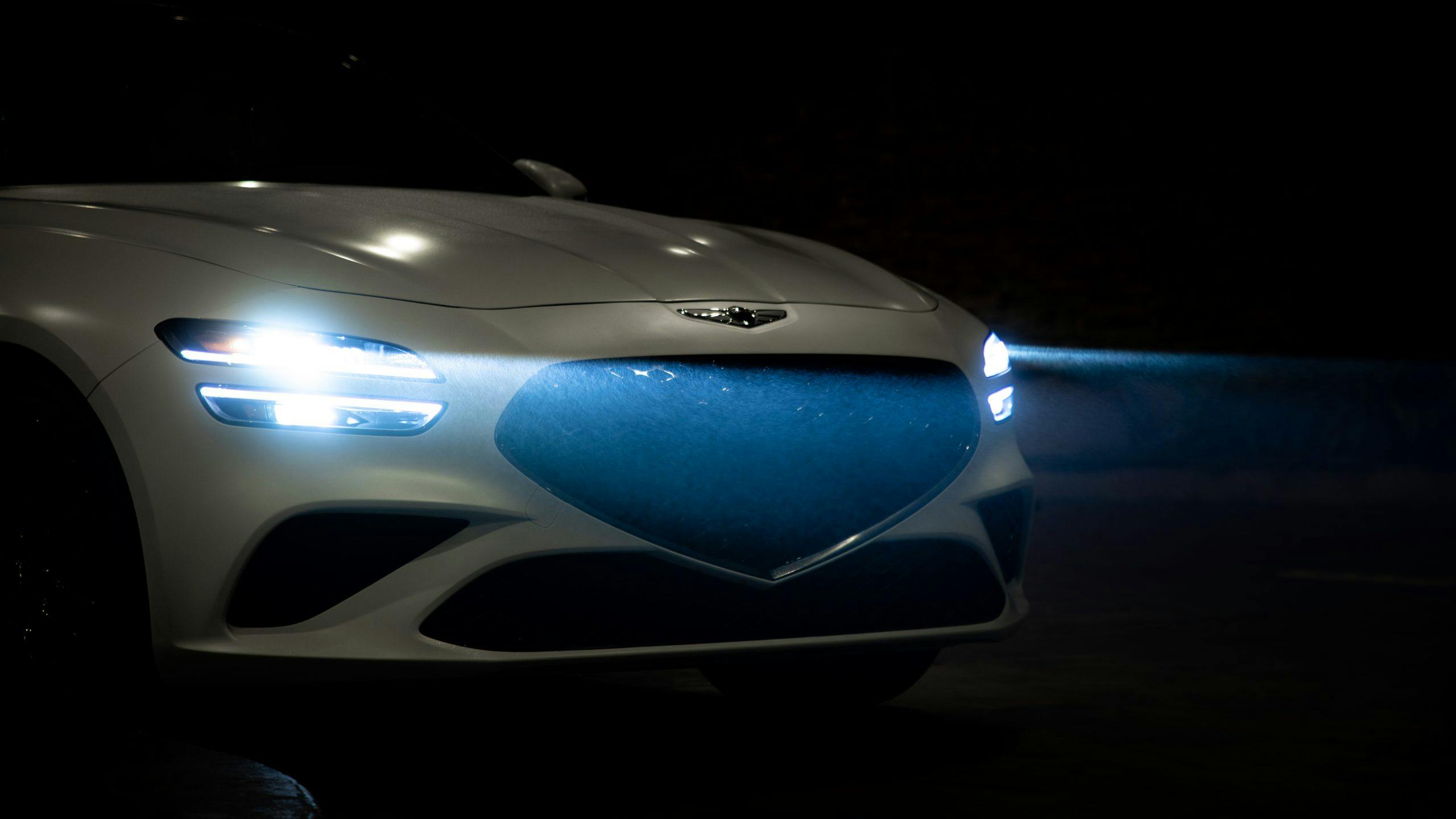

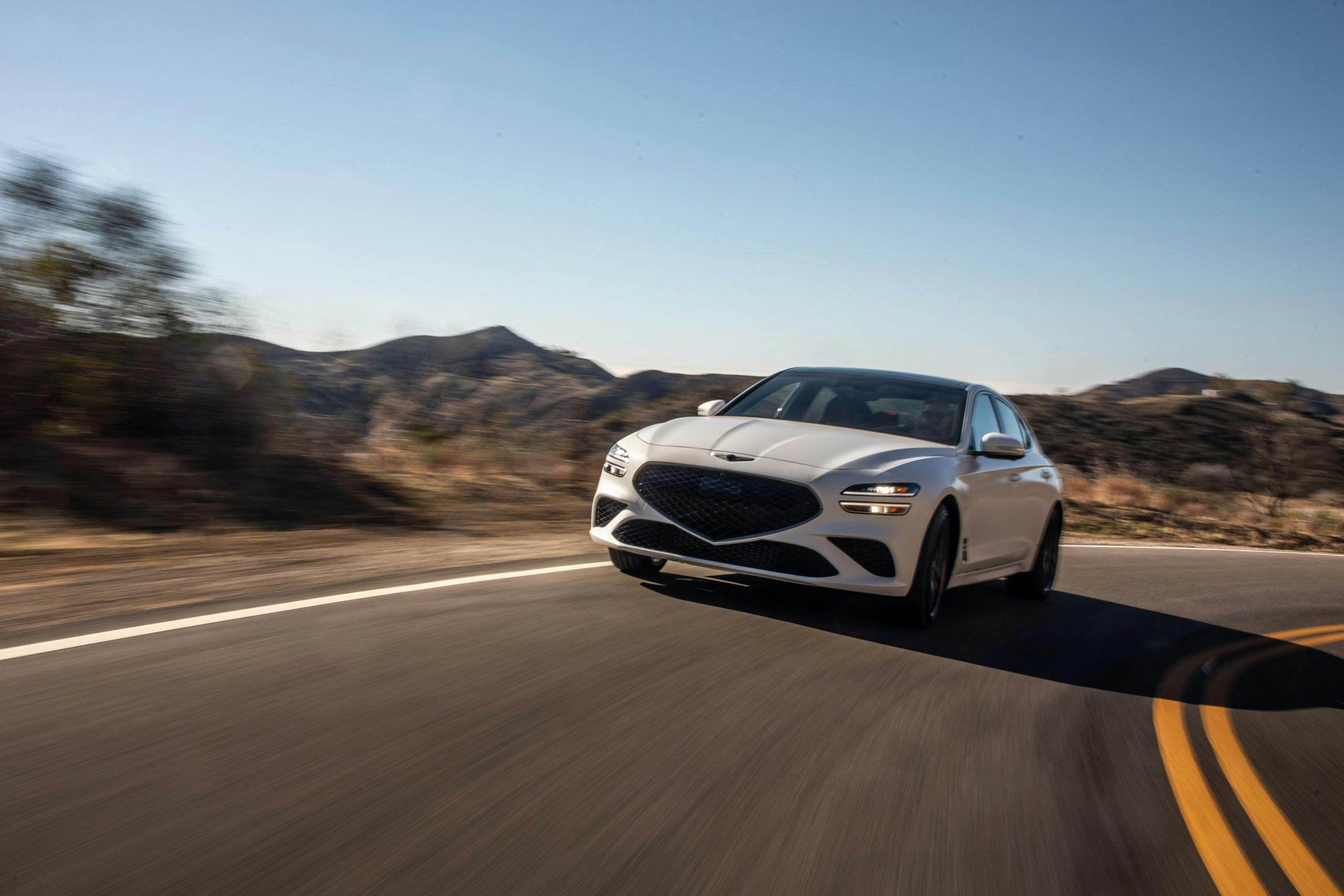
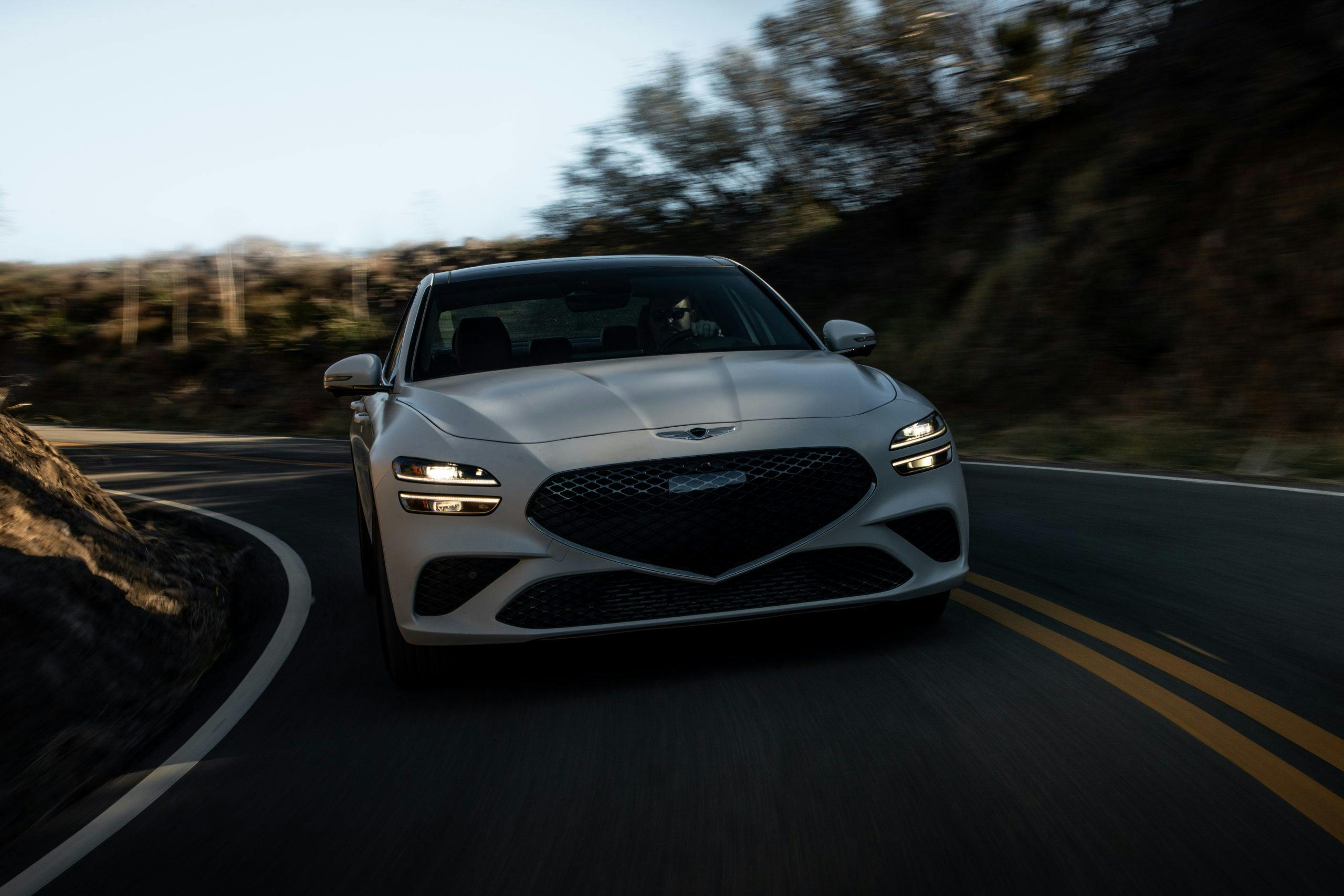
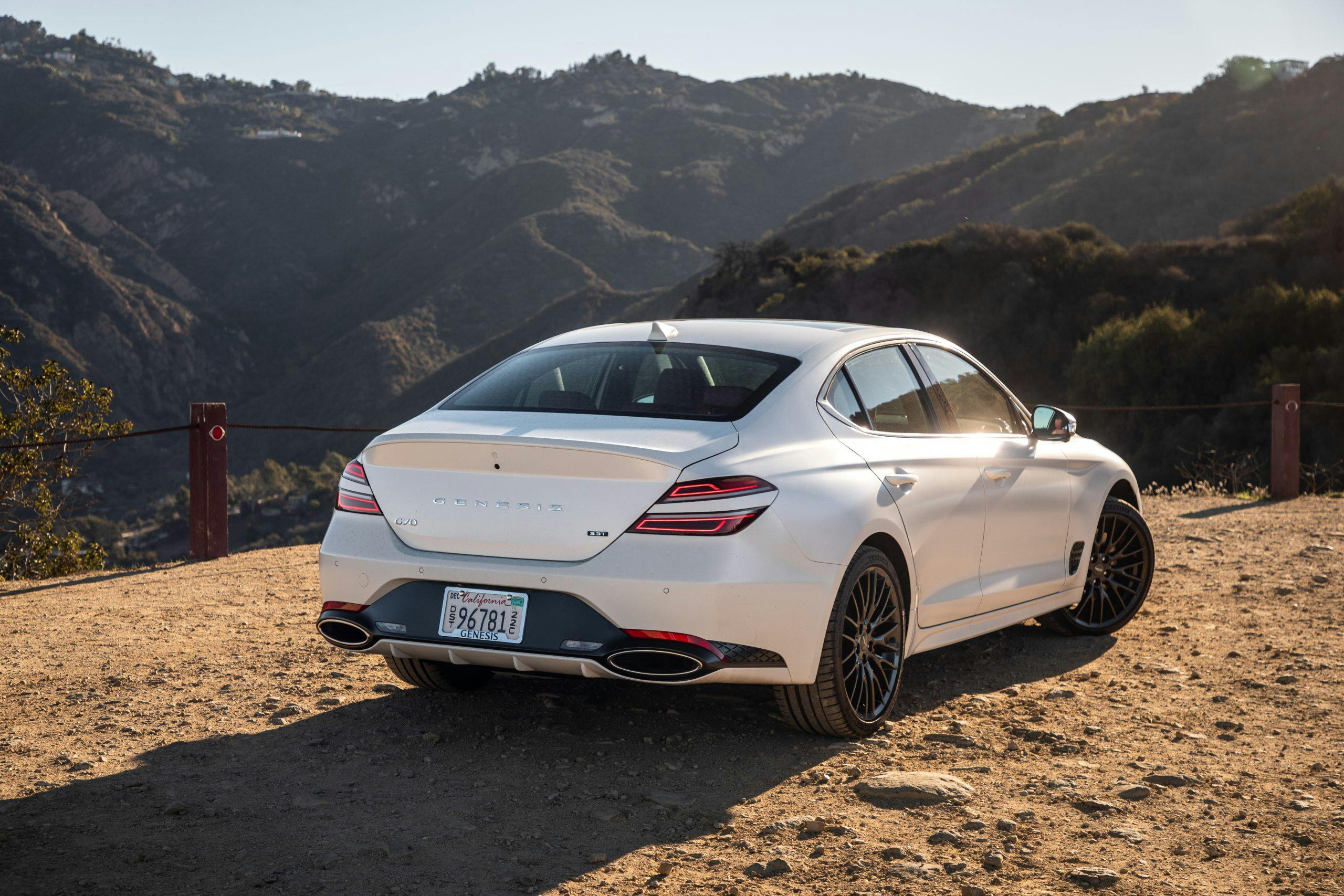
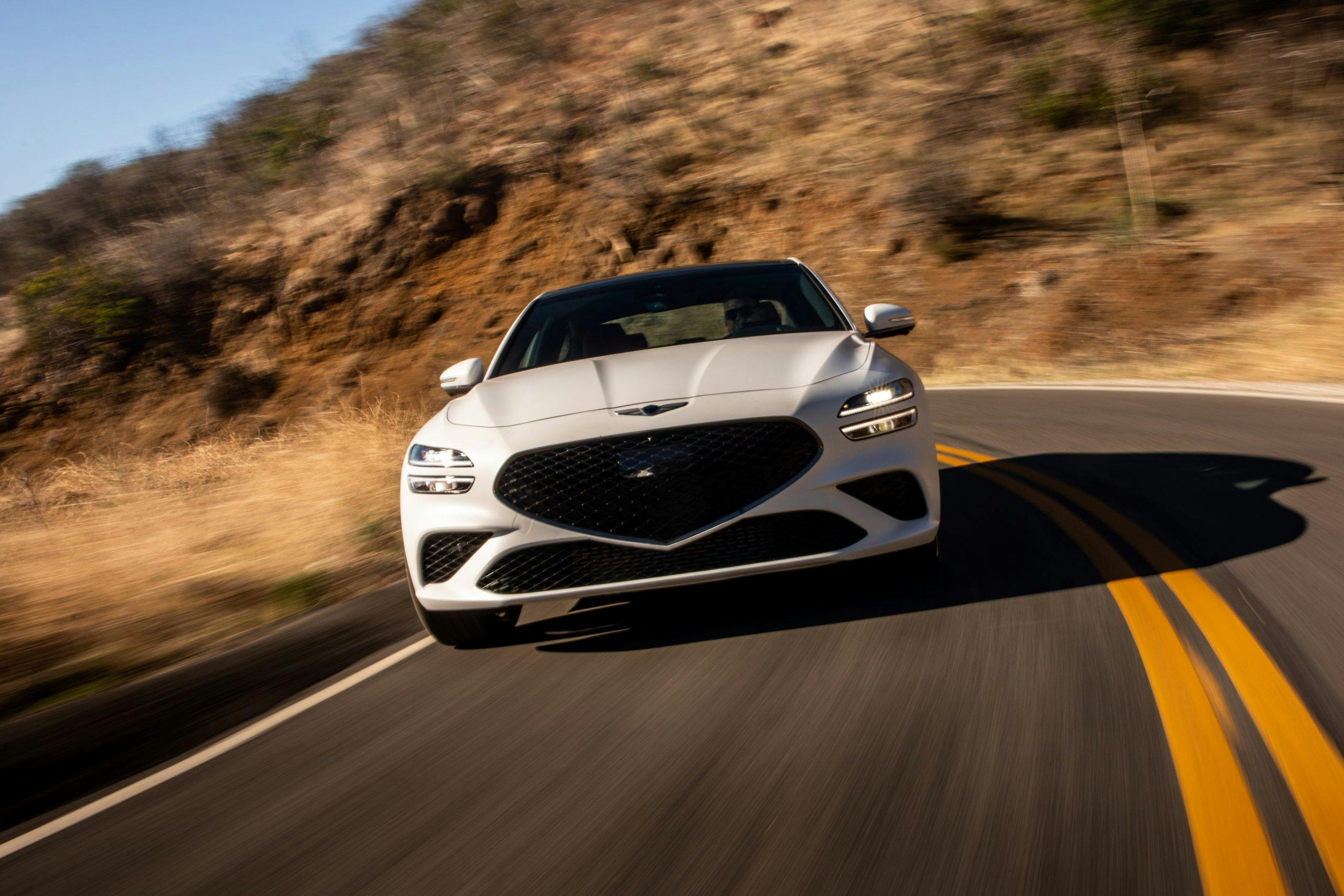
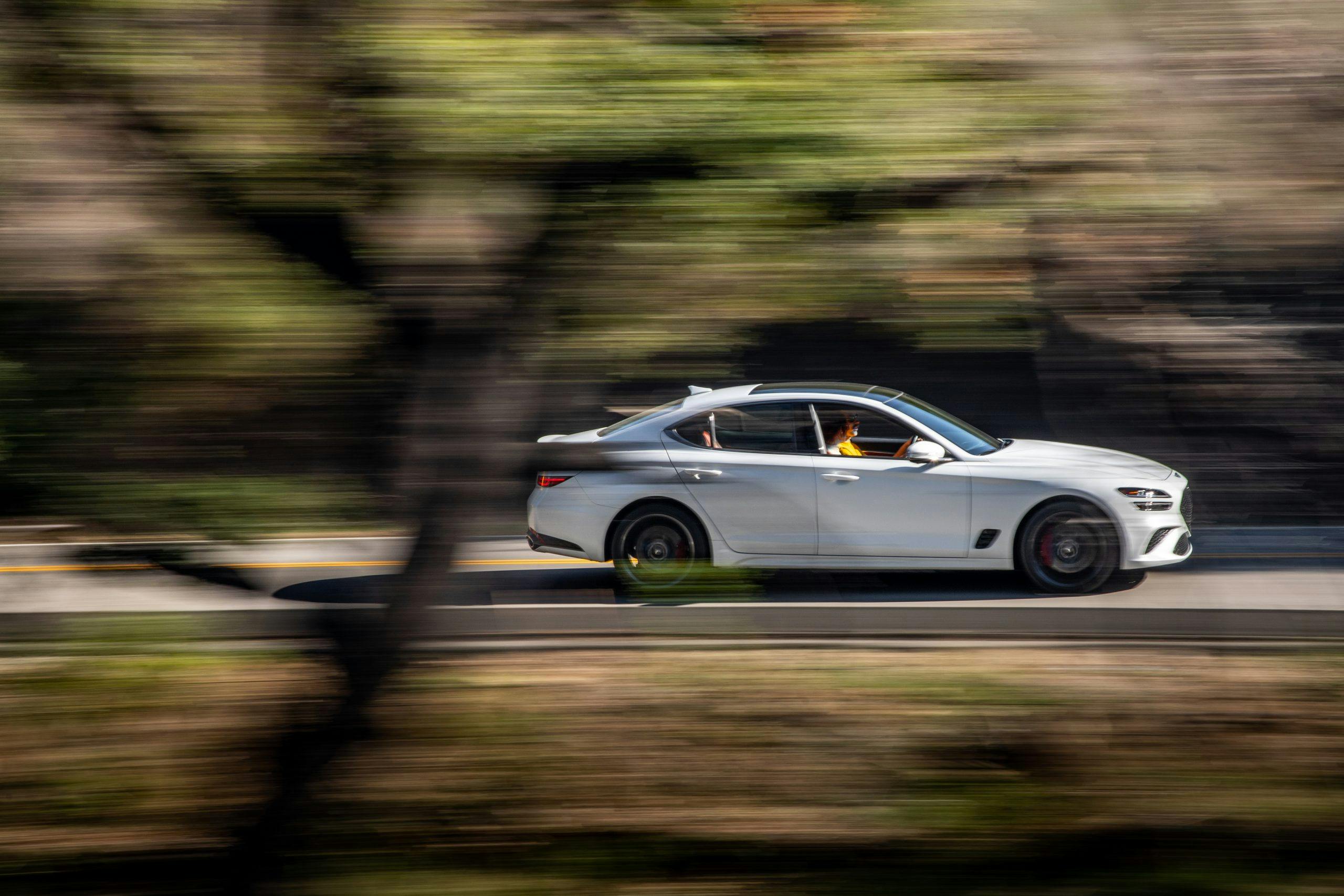
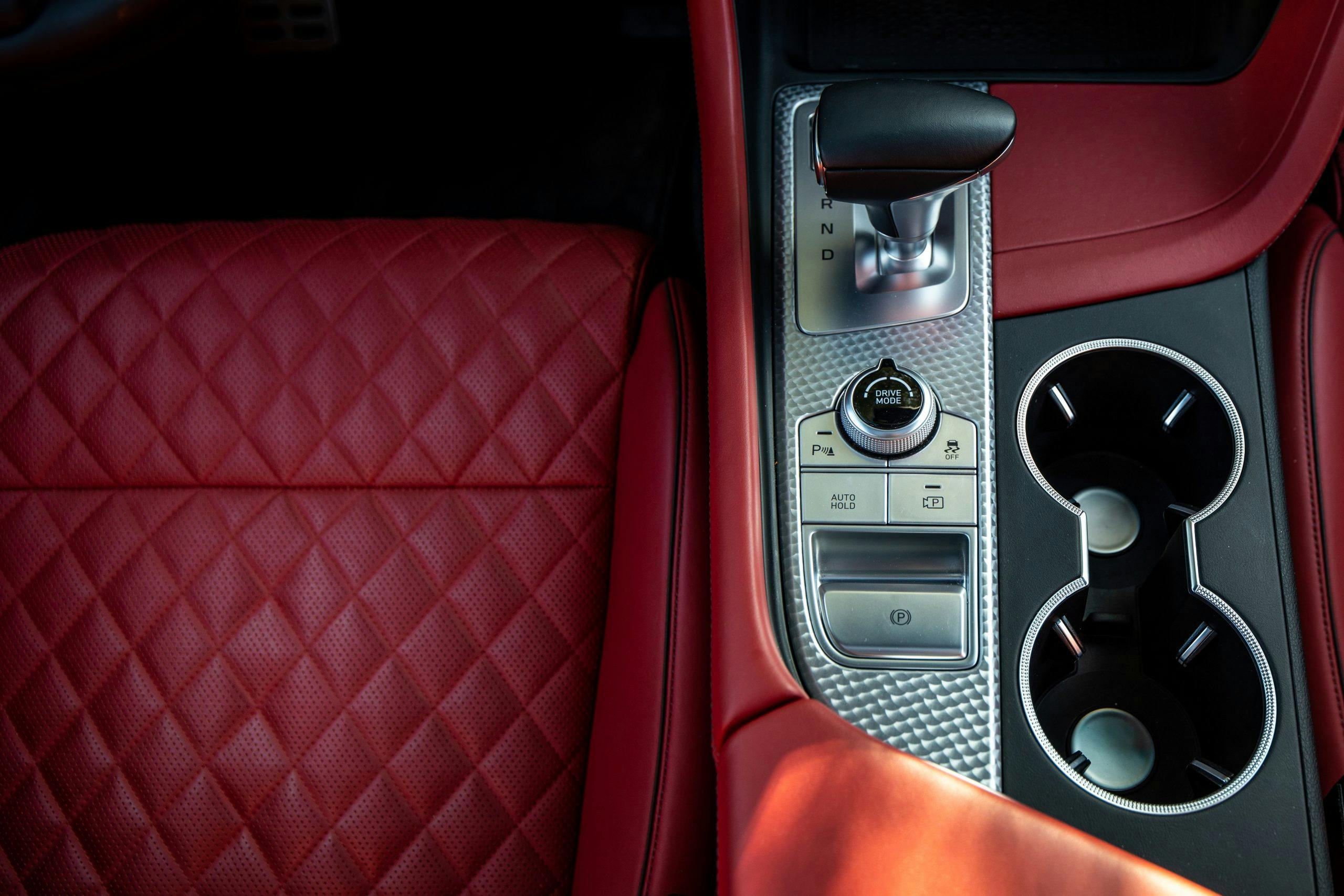








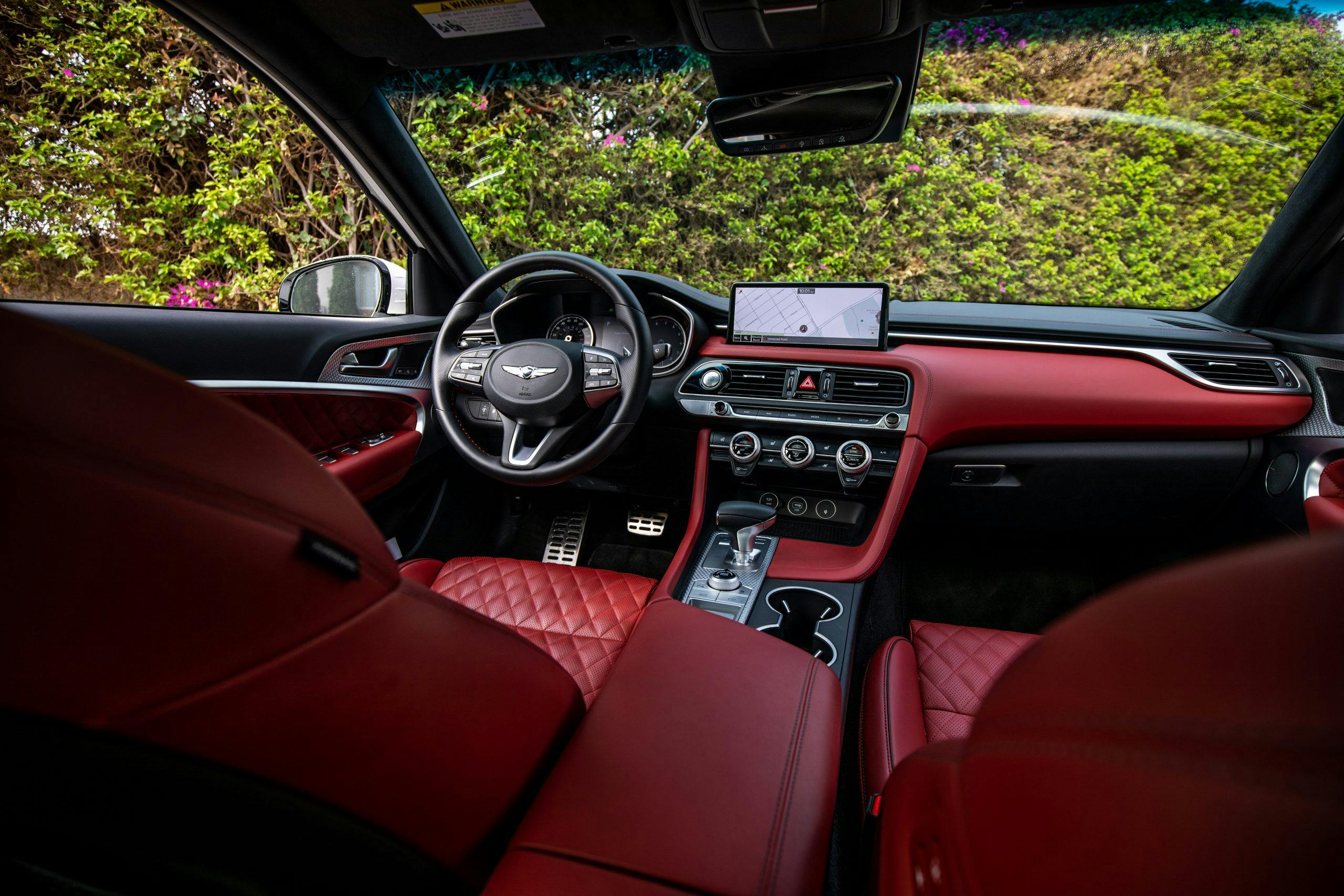













Great review. Your last paragraph nailed the appeal of this car perfectly. It’s my first luxury car. My last two cars were a 2020 Honda Civic Si (traded in), and a 2013 Honda Accord Sport 6MT (still have). So I could give a rat’s ass about brand prestige and dealership experience. I did love that Genesis avoided buying into the “all touch screens, all the time” tendency of the German brands, also. Frankly, for the mountain road driving that I like doing for entertainment, I think the Acura TLX Type S would have been a better choice, but since Honda seems to be committed to making its best performance cars unobtainium + dealer markups (Civic Type R, TLX Type S), it really wasn’t very hard to mosey on over to the Genesis store to buy a G70 3.3 Turbo.